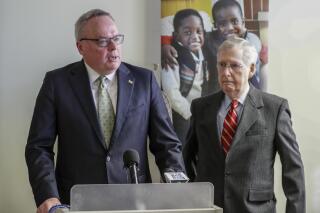Report: Pandemic a role in Kentucky’s record overdose deaths

FILE - In this March 18, 2019 file photo, James Carroll, director of the Office of National Drug Control Policy, speaks at Volunteers of America as Senate Majority Leader Mitch McConnell looks on in Louisville, Ky. Drug overdose deaths surged by nearly 50% last year in Kentucky, where opioid addiction mixed with pandemic-related stress to set a new record for tragedy and grief from a crisis that continues to ravage the region, a new report said, Wednesday, Aug. 4, 2021.(Michael Clevenger/Courier Journal via AP, File)
FRANKFORT, Ky. (AP) — Fatal drug overdoses in Kentucky — an ongoing scourge that has ravaged communities in the state — surged nearly 50% last year and isolation caused by the COVID-19 pandemic was a “major contributing factor,” a state report concludes.
More than 1,964 Kentuckians died from drug overdoses in 2020, according to the report from the Kentucky Justice and Public Safety Cabinet and the Office of Drug Control Policy. The official count easily eclipsed the state’s prior record level of fatal drug overdoses and mirrored a national increase in overdose deaths, the report said.
Kentucky’s rising death toll was driven by opioid abuse. A key factor was the prevalence of fentanyl — involved in about 71% of the state’s overdose deaths for the year, according to the report, issued Tuesday. Fentanyl is a powerful synthetic opioid increasingly added to other illicit drugs to boost potency.
Kentucky has long been plagued by high rates of addiction to opioid painkillers. But the Office of Drug Control Policy pointed to the COVID-19 pandemic as a “major contributing factor” in the surge in deaths.
“The interruption of routine for those in recovery, the sense of isolation, economic concerns and anxiety all contributed to the dramatic increase recorded,” the report said.
Matt Brown, a senior vice president for Addiction Recovery Care, a private behavioral health organization that provides drug treatment and recovery services in eastern and central Kentucky, said the pandemic created a “storm that helped to fuel a fire that was already burning.” Demand for services dropped for months after the virus hit as people hunkered down, he said.
“Addiction is a disease of isolation,” Brown said. “And the antidote to addiction is healthy connections and healthy relationships. ... COVID destroyed some of that support network.”
That sense of isolation was heightened by pandemic-related lockdowns that temporarily suspended in-person group meetings and treatment services for people in recovery as well as in-person services at churches, another key source of support, officials said.
Matthew Davidson fell victim to the deadly surge in 2020. The 31-year-old was beating his heroin addiction, attending group recovery meetings, and had a restaurant job. When the pandemic hit, Davidson lost his job. He started staying home alone in his apartment near Georgetown, Kentucky — depressed and yearning for his recovery support group that had stopped gathering in person, said his cousin Melanie Wyatt. His girlfriend came home to find him dead of a drug overdose.
Another factor contributing to the 49% increase in Kentucky’s drug overdose deaths was the availability of potent, inexpensive methamphetamines, the report said.
Kentuckians in the 35-44 age group represented the largest demographic in overdose deaths, followed closely by the 25-34 age group and then the 45-54 group, it said.
Nationally, overdose deaths soared to a record 93,000 last year in the midst of the COVID-19 pandemic, the U.S. government reported recently. That estimate far eclipses the high of about 72,000 drug overdose deaths reached the previous year and amounts to a 29% increase.
For years, money has flowed into Kentucky to try to beat the drug epidemic, and political leaders from both major parties have declared it a top priority.
Gov. Andy Beshear’s administration said it has awarded grant funding across the state to increase access to treatment services and recovery programs. State efforts include programs that focus on reducing addiction, preventing reincarceration, increasing the distribution of the life-saving drug naloxone and removing barriers to treatment.
“This past year has been devastating,” the Democratic governor said. “Between the battle against the global COVID-19 pandemic and the opioid crisis, Kentucky has been hit hard. Now more than ever, we need every resource and everyone working together to stop this scourge, which continues to shatter families and ravage our communities.”
U.S. Senate Republican leader Mitch McConnell has delivered almost $300 million of federal funding to support Kentucky’s prevention, treatment and enforcement efforts, the Kentuckian’s office said.
Meanwhile, a new Kentucky law is designed to bolster those grassroots efforts. The measure aims to make Kentucky communities “recovery ready” by having an array of resources in place, including employment, transportation, recovery meetings and support groups.
State Rep. Adam Bowling, the measure’s lead sponsor, said it recognizes the “importance and value of engaging our communities to seek local options for prevention, treatment and recovery from the substance use epidemic.”
Kentucky also stands to eventually reap more than $460 million to combat its opioid-addiction problems as its share from a possible $26 billion settlement with several pharmaceutical companies, Republican Attorney General Daniel Cameron announced recently.
___
The KY Help Call Center is available to help. Call 833-859-4357 to speak one-on-one with a specialist.
___
Associated Press writer Adrian Sainz in Memphis, Tennessee, contributed to this report.
